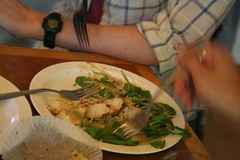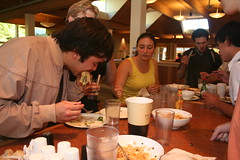As discussed here last year, Portland’s Reed College has a unique way of avoiding food waste. The small college has a well-established tradition (dating back to the 1960s) where “scroungers” eat the leftovers of those with meal plans.Â
Students with board points drop off their uneaten food at the scrounge tables on their way to the dish return in cafeteria, the Commons. Scroungers gradually fill up by eating a some of this and some of that. Â
 I recently visited Reed to observe and, OK, experience scrounging. After trying it, my first reaction was, ‘Only at college.’ My second was, ‘This ain’t so bad.’ You get to taste a variety of items and, knowing you’re preventing food from going to waste, the eating feels virtuous.
I recently visited Reed to observe and, OK, experience scrounging. After trying it, my first reaction was, ‘Only at college.’ My second was, ‘This ain’t so bad.’ You get to taste a variety of items and, knowing you’re preventing food from going to waste, the eating feels virtuous.
Upon further reflection, though, an economic lens seems most apt: There are some students—maybe 100 out of 1,500—who are willing to trade convenience, time and choice for money. (Scroungers don’t pay for a meal plan.)
You’re probably thinking ‘what about the risk of illness?’ All the scroungers I talked to said that sharing others’ germs made their immune systems more robust. I’m sure some doctors may beg to differ, but in the students’ minds, that’s not part of the tradeoff.
For all the health risks, the practice does have a health upside. By forcing students to eat piecemeal as the food trickles in, it encourages a grazing approach—eating small amounts over a longer period of time. This would likely prevent overeating. In an era of obesity, let’s just say scroungers are pretty lean folks.
I spoke with Michael Leidecker, Reed’s Associate Dean of Resident Life about scrounging. Leidecker, who eats regularly in The Commons and, like many, gives his leftovers to the scroungers, said that the practice is ingrained at Reed:
It has been alive and well for years…It’s a part of who we are. It works well.
Scrounging is definitely a social activity. There are stretches of time where there’s no  food—just five or six students standing around talking. In that way, scrounging provides common ground for people who may share very few similarities other than being a Reed student who doesn’t want to pay for his or her food.
food—just five or six students standing around talking. In that way, scrounging provides common ground for people who may share very few similarities other than being a Reed student who doesn’t want to pay for his or her food.
With the “Principles of the Scrounge” posted right behind the scroungers’ table, new students quickly learn how it works. There’s also the “Scrounge Commandments” printed annually in the school paper (“Thou shalt not covet the trays of those who have not yet eaten.”) Per the rules, scroungers let the paying customers (be they student, faculty or staff)come to them and thank the donors for their leftovers.
I was impressed with the communal spirit of the Scrounge. There’s plenty of sharing and no hoarding. With most items (pizza crusts are a biggie), scroungers take a bite and pass it along. Etiquette dictates that scroungers use forks, not fingers. Then again, a few scroungers are partial to spoons and at least one uses really long chopsticks.Â
Utensils or not, there are times when ‘the scrounge’ takes on the rule of the jungle feel. Jose Palafox, a junior from Sacramento, put it nicely: Â
At its core, it’s a free for all for free food.
 Scrounging could work elsewhere, but it likely won’t because it relies on the practice being socially acceptable. Many Reed scroungers have been frustrated when eating off campus because the same perfectly edible food is off limits. That doesn’t mean some Reedies haven’t tried to scrounge at restaurants or elsewhere. Â
Scrounging could work elsewhere, but it likely won’t because it relies on the practice being socially acceptable. Many Reed scroungers have been frustrated when eating off campus because the same perfectly edible food is off limits. That doesn’t mean some Reedies haven’t tried to scrounge at restaurants or elsewhere. Â
Laura Bradley, a senior biology major, said that she tried to scrounge at a nearby ski resort’s cafeteria:
I asked people if they were done with their food. Some didn’t mind, some did. I think one of the people who wasn’t pleased told the manager. The manager came out and said ‘That’s disgusting, you should be ashamed of yourself.’ He threw me out. I wish restaurants had a better system for distributing food. Â
Avoiding waste is an unintended (and happy) byproduct of scrounging. Most participants’ primary motivation is saving money. Yet, it’s not that all scroungers couldn’t afford to buy food. After all, a spartan bowl of rice and beans in the Commons goes for $1.05. Still, this being college, some students opt to save their means for…more recreational ends. And who can blame them for that?
14 Comments